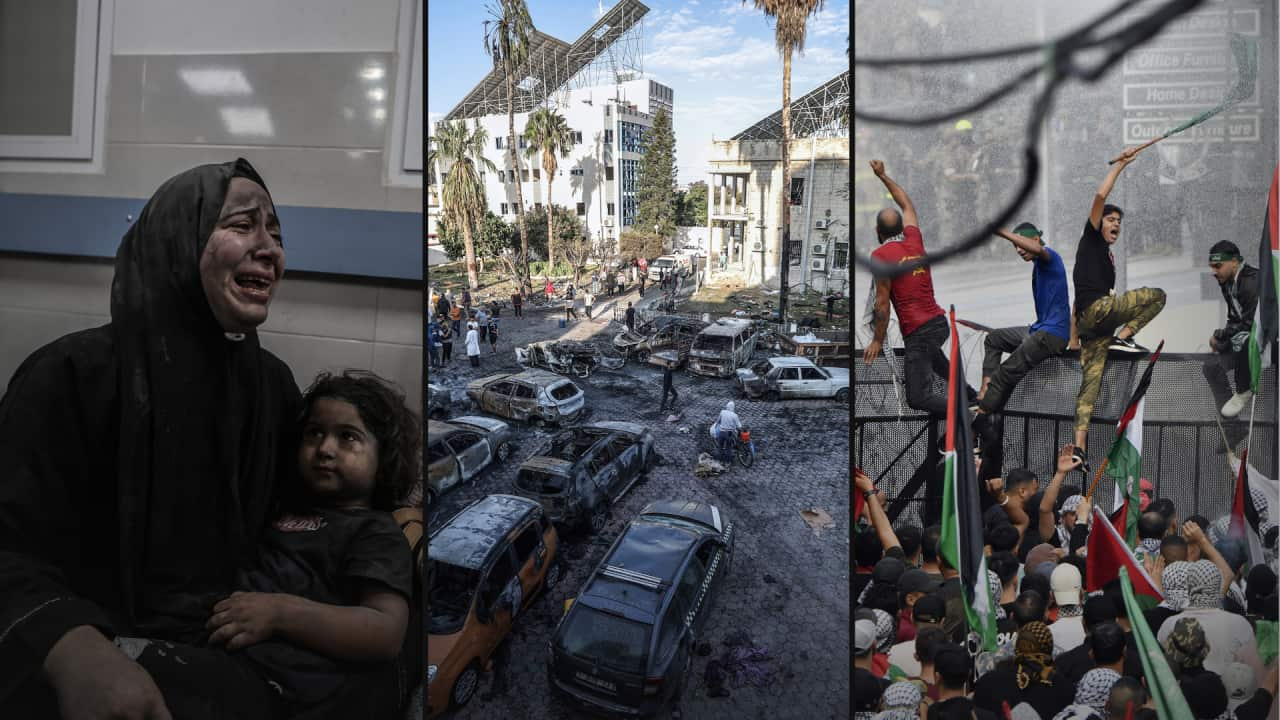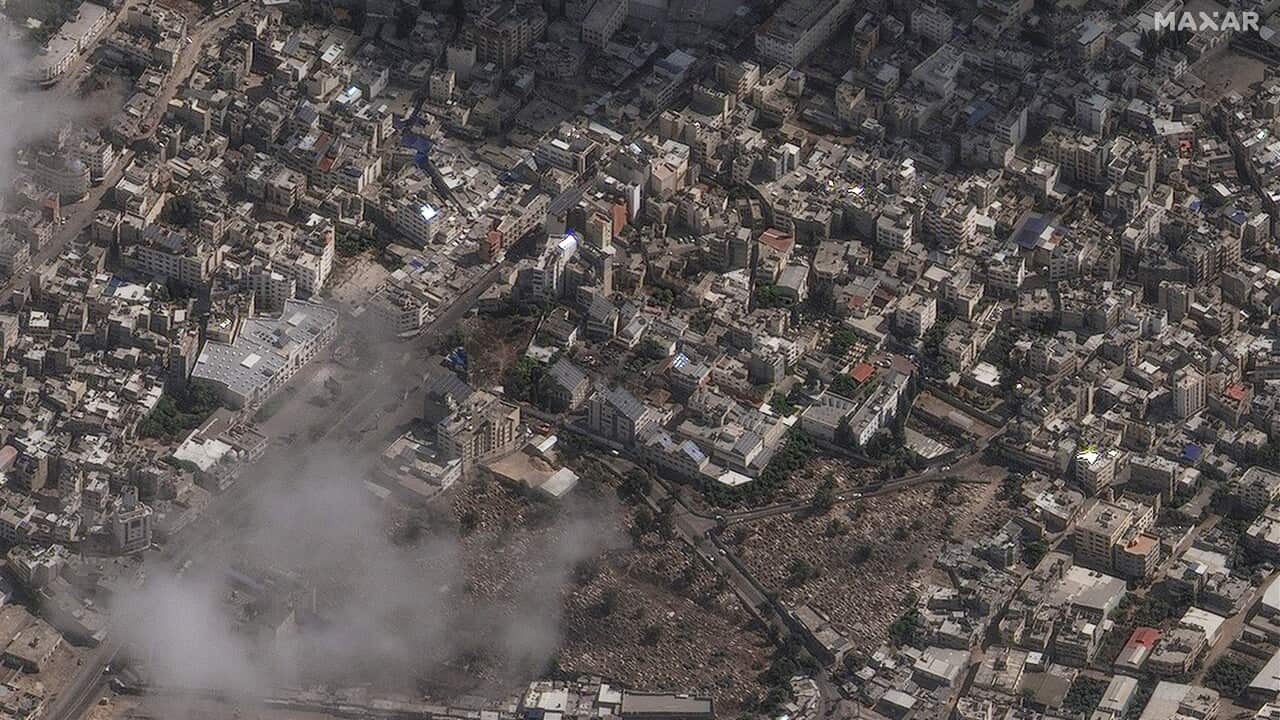Egypt has agreed to reopen its border crossing with to allow aid to reach Palestinians, the US says, as the humanitarian crisis worsens for the 2.3 million people trapped in the enclave and anti-Israel protests flare across the Middle East.
US President Joe Biden discussed aid for Gaza with Egyptian President Abdel Fattah El-Sisi by phone late on Wednesday, while flying home from a less than eight-hour visit to Israel.
Biden told reporters that Sisi had agreed to open the Rafah crossing from Egypt to Gaza to allow about 20 trucks carrying humanitarian aid into the enclave, where people are desperately short of food, water, fuel, and other essentials after Israel unleashed a blockade and air strikes 12 days ago.
Biden did not give a timeline for the opening, but US national security spokesperson John Kirby said it would occur in the coming days following repairs to the road.
British Prime Minister Rishi Sunak landed in Tel Aviv on Thursday, hours after Biden left, carrying similar messages of support and condolence for Israelis.
He offered Israeli President Isaac Herzog his country's solidarity, saying London supported Israel's right to defend itself while also calling for humanitarian access to Gaza.

British Prime Minister Rishi Sunak (left) offered Israeli President Isaac Herzog his country's solidarity on Thursday. Source: AAP / Kobi Gidon
"Palestinians are victims of what Hamas has done. It's important that we continue to provide humanitarian access."
At least seven British nationals have been killed and at least nine are still missing, Sunak's spokesperson said on Wednesday.
Middle East 'at the brink': Fresh fears as protests rage
The escalating violence between Israel and Hamas risks ramping up conflict in the Middle East, according to a United Nations official, amid regional fury in the wake of an explosion at a hospital in Gaza and warnings from Lebanese militant group Hezbollah.
The warning from UN Middle East peace envoy Tor Wennesland came as Israel and Hamas traded blame for Tuesday's explosion at Gaza's al-Ahli Arab Hospital.

Source: SBS News
Israel's assertion was backed by Biden during his visit to Tel Aviv, who said the deadly blast seemed to have been caused by a rocket misfired by militants.
In Washington, the White House National Security Council echoed Biden, saying the US assessment was based on analysis of overhead imagery, intercepts, and open-source information.
Wennesland told the UN Security Council the hospital blast needed more investigation.
"I fear that we are at the brink of a deep and dangerous abyss that could change the trajectory of the Israeli-Palestinian conflict, if not of the Middle East as a whole," he said.
Wennesland continued: "After more than a century of conflict, and over half a century of occupation, we, the international community, have failed collectively to bring the parties to adjust to stay in political resolution."
The significant escalation is the latest in a long-standing conflict between Hamas and Israel.
Hamas is a Palestinian military and political group, gaining power in the Gaza Strip since winning legislative elections there in 2006.
Hamas’ stated aim is to establish a Palestinian state, while refusing to recognise Israel’s right to exist.

US President Joe Biden (left) and Israeli Prime Minister Benjamin Netanyahu. Source: AAP, EPA / Miriam Alster
Biden said the United States would do everything it could to ensure Israel was safe while also urging Israelis not to be consumed by rage, reiterating that the vast majority of Palestinians were not affiliated with Hamas.
The Gaza health ministry said 3,478 Palestinians have been killed and 12,065 injured in Israeli air strikes on the besieged enclave since 7 October.
Biden said the US would provide US$100 million ($158 million) in new funding for humanitarian aid to Palestinians in Gaza and the Israeli-occupied West Bank.
"What sets us apart from the terrorists is we believe in the fundamental dignity of every human life," Biden said. If that was not respected, "then the terrorists win."

A Palestinian girl carries blankets as she walks past the site of a deadly explosion at al-Ahli Arab Hospital hospital in Gaza City on Wednesday. Source: AAP, AP / Abed Khaled
Egypt, which previously said the Rafah crossing was not technically closed but was inoperable due to Israeli barrages, said Sisi and Biden agreed to provide aid to Gaza "in a sustainable manner". They were co-ordinating an aid effort with international organisations under the UN.
During Biden's visit, Prime Minister Benjamin Netanyahu's office said Israel would let food, water and medicines reach southern Gaza via Egypt, but reiterated that it would not let aid in from Israel until Hamas released Israeli hostages.
Biden's Middle East trip was designed to calm the region, but Jordan called off his planned summit there with Egypt and the Palestinian Authority after the hospital blast. Instead, he was expected to hold phone calls with Jordan and Egypt from Air Force One on his way home.
The accounts of destruction at the hospital were horrific even by the standards of the past 12 days, which have confronted the world with relentless images, first of Israelis in their homes and then of Palestinian families buried under rubble from .
Rescue workers scoured blood-stained debris for survivors. The Gaza health ministry put the death toll at 471, though Israel disputed the figure.
"We don't know what it was, but we found out what it could do, after it targeted children, who were cut into pieces," said Mohammad Al-Naqa, a doctor at the hospital who said 3,000 people were sheltering there when it was hit.

Riot police used tear gas against protesters during a demonstration near the US. embassy in Aukar, a northern suburb of Beirut, Lebanon, on Wednesday. Source: AAP, AP / Hassan Ammar
The blast unleashed anger across the Middle East.
In Lebanon, security forces fired tear gas and water cannons at protesters throwing projectiles near the US embassy north of Beirut. State-sponsored marches were held across Iran, with demonstrators carrying banners that read "Death to America" and "Death to Israel".
"Every drop of blood of Palestinians killed in this war brings the Zionist regime (Israel) closer to its downfall," Iranian President Ebrahim Raisi said in a televised speech.
There were new clashes on Israel's border with Lebanon, part of the deadliest violence between the Hezbollah movement and Israel since the last all-out war in 2006, and Hezbollah warned its adversaries on Wednesday it was "thousands of times stronger" than before.
Hezbollah official Hashem Safieddine, in a speech to thousands of supporters, said Biden, Netanyahu and "malicious Europeans" should be careful.

State-sponsored marches were held across Iran, with demonstrators carrying banners that read "Death to America" and "Death to Israel". Source: AAP, AP / Vahid Salemi
"Because what we have is faith, and God is stronger than you, all your battleships, and all your weapons," he said, speaking at a rally called in response to the blast at the al-Ahli Arab Hospital.
The United States has warned Iran, which backs Hezbollah and the Palestinian group Hamas, against getting involved in the crisis, and deployed two aircraft carriers which it says aim to deter any state or non-state actor seeking to escalate the war.










